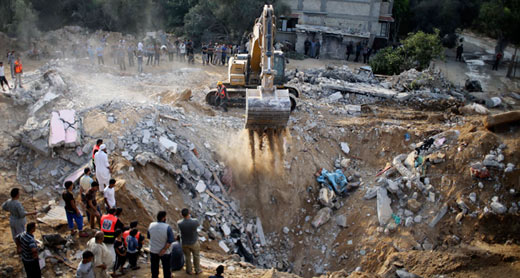Israel/Palestine
Related: About this forumIsraeli authorities have proven they cannot investigate suspected violations of international human
law by Israel in the Gaza Strip

Israel launched Operation Protective Edge in the Gaza Strip on 8 July 2014 and ended it, after a ceasefire was declared, on 26 August 2014. During the operation, Israel violated international humanitarian law in some cases, and many other cases are highly suspect. However, B’Tselem does not intend to demand that these suspicions be investigated by Israel’s current investigation mechanisms. This is due to the experience that B’Tselem gained following past military offensives in the Gaza Strip, which shows that there is currently no official body in Israel capable of conducting independent investigations of suspected violations of international humanitarian law. Israel's law enforcement system, in its present form, cannot adequately address suspicions regarding the military’s conduct during attacks on the Gaza Strip in three major areas:
Investigating senior political officials and military commanders: The overall policy guiding the military's actions is laid out by senior political officials, who are also involved in making and authorizing operational decisions. Other decisions are made by senior military commanders whose rank is either equivalent to that of the MAG or higher. In both cases, no mechanism exists for investigating the lawfulness of actions authorized on those levels.
The MAG's dual role: On one hand, the MAG gives legal counsel to the military before and during combat; on the other hand, he is responsible for deciding whether to open criminal investigations into soldiers' conduct. This dual role creates an inherent conflict of interests in cases where orders and commands given following the MAG's counsel raise suspicion that the law was breached. In these situations, the MAG – who was responsible for legally authorizing measures suspected of being unlawful – is charged with retrospectively deciding whether to initiate a criminal investigation into his own conduct and that of his subordinates.
Investigating incidents in which soldiers are suspected of having breached military orders: In the vast majority of such cases, investigations focus only on the conduct and responsibility of low-ranking soldiers and commanders in the field. First, an operational inquiry is usually carried out; then, the MAG decides whether to order an investigation by the Military Police Investigations Unit (MPIU) based on the inquiry's findings. In the rare instances in which an investigation is indeed opened, its findings are passed on to the MAG Corps, where the decision is made as to which measures – if any – are to be taken against the persons involved. Carrying out an operational inquiry in the unit prior to an MPIU investigation delays the criminal investigation – sometimes by many months. Furthermore, it compromises the reliability of eyewitness accounts given by soldiers, who provide their versions during the operational inquiry. MPIU investigators often cannot reach the scene of the incident and have difficulty obtaining testimony from Palestinian victims or witnesses. These procedures are so lengthy that, in some cases, the MAG's decision whether or not to take steps against the perpetrators is made several years after the incident. B'Tselem encountered these issues in the last two military offensives Israel conducted in the Gaza Strip – Operation Cast Lead (2009) and Operation Pillar of Defense (2012).
in full: http://www.btselem.org/accountability/20140905_failure_to_investigate